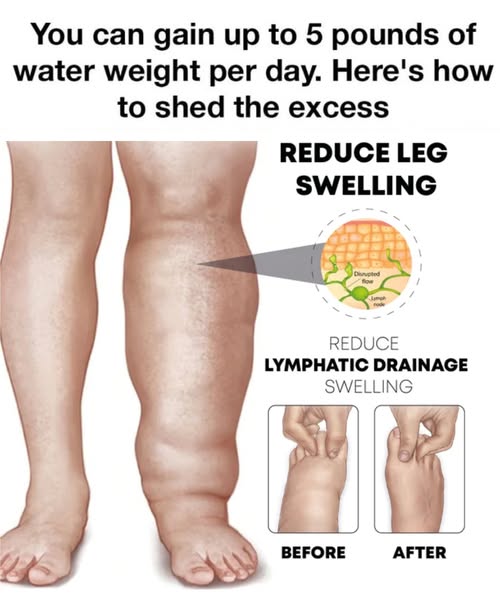Introduction
Have you ever stepped on the scale in the morning, only to find that you’re suddenly 3–5 pounds heavier than you were yesterday? Don’t panic—it’s not fat gain. What you’re experiencing is water weight (also called fluid retention). Unlike fat, water weight can fluctuate rapidly depending on your diet, lifestyle, and hormones. The good news is, it’s temporary and reversible.
In this article, we’ll break down why you can gain up to 5 pounds of water weight per day, the most common causes, and proven strategies to shed the excess quickly. We’ll also answer frequently asked questions and give you actionable, science-backed solutions to feel lighter, healthier, and in control of your body again.
What Is Water Weight?
Water weight refers to the extra fluid your body holds in its tissues, outside of your regular hydration levels. While water makes up 60% of the human body, fluctuations beyond that normal balance can cause bloating, puffiness, and a sudden jump on the scale.
Unlike fat gain, which requires weeks of overeating, water weight can change dramatically within hours—which is why your body weight can swing so quickly from one day to the next.
Why You Can Gain Up to 5 Pounds of Water Weight Per Day
Several factors can cause these rapid increases:
1. High Sodium Intake
- Eating salty foods like chips, pizza, or fast food causes your body to retain more water.
- Research shows that even 1,000 mg excess sodium can trigger significant bloating within 24 hours.
2. Carbohydrate Overload
- Carbs are stored in the body as glycogen, and each gram of glycogen binds to 3–4 grams of water.
- That’s why after a carb-heavy weekend, you may feel heavier and puffier.
3. Hormonal Changes
- Women often experience water retention due to hormonal fluctuations during their menstrual cycle.
- Estrogen and progesterone shifts can cause 2–5 pounds of extra fluid retention before menstruation.
4. Dehydration
- Ironically, not drinking enough water makes your body hold on to the little it has.
- This “survival mode” leads to swelling in the hands, feet, and face.
5. Alcohol Consumption
- Alcohol dehydrates your body, leading to electrolyte imbalances.
- In response, your body retains water the next day, causing puffiness and bloating.
6. Lack of Exercise
- Sitting or standing for long hours prevents proper circulation, especially in the legs.
- This leads to fluid pooling and swelling in your ankles and feet.
How to Shed Excess Water Weight Fast
The best part about water retention is that it’s temporary and manageable. Here are proven, actionable strategies to get rid of excess water weight:
1. Drink More Water (Yes, Really!)
It may sound counterintuitive, but drinking more water signals your body that it doesn’t need to hold on to excess fluid. Aim for 8–10 glasses daily to flush out sodium and toxins.
2. Reduce Sodium Intake
Cutting back on processed foods and replacing salt with herbs and spices can reduce water retention significantly. Studies show that lowering sodium intake can decrease water weight by up to 2 pounds in 24 hours.
3. Balance Electrolytes
Include potassium-rich foods like bananas, avocados, and spinach. Potassium helps balance sodium levels and promotes fluid balance.
4. Cut Back on Carbs Temporarily
Lowering carb intake for a few days encourages your body to use stored glycogen and release the water attached to it. This is why low-carb diets often cause rapid initial weight loss.
5. Exercise Regularly
Sweating through cardio or strength training helps release excess fluids. Even 30 minutes of moderate exercise can significantly reduce bloating.
6. Limit Alcohol
Reducing alcohol intake prevents dehydration and the rebound water retention that follows.
7. Try Natural Diuretics
Certain foods and drinks—like green tea, dandelion tea, cucumber, and celery—act as natural diuretics, helping your body release water more efficiently.
8. Get Quality Sleep
Poor sleep increases cortisol, a stress hormone that triggers water retention. Aim for 7–9 hours per night to restore balance.
Frequently Asked Questions (FAQs) About Water Weight
1. Is water weight the same as fat gain?
No. Fat gain takes time and requires excess calories, while water weight can fluctuate daily. You can’t gain 5 pounds of fat overnight, but you can gain 5 pounds of water.
2. How long does it take to lose water weight?
Most people can shed excess water weight within 24–72 hours with proper hydration, diet, and lifestyle adjustments.
3. Does sweating help reduce water weight?
Yes. Exercise and sweating help release excess fluids, but hydration is essential to prevent rebound retention.
4. Can stress cause water retention?
Absolutely. Stress increases cortisol, which disrupts fluid balance and leads to bloating.
5. What’s the fastest way to get rid of water weight before an event?
The fastest methods include cutting sodium, increasing water intake, eating potassium-rich foods, and exercising lightly to sweat out excess fluids.
The Psychology Behind Water Weight: Why the Scale Lies
Stepping on the scale and seeing a sudden 5-pound increase can be discouraging, especially if you’re working hard on your health goals. However, remember:
- It’s not body fat. You’d need to consume over 17,500 calories in one day to gain 5 pounds of fat.
- Water weight is temporary and often resolves within days.
- Focusing on long-term health habits instead of daily scale fluctuations is the key to progress.
Key Statistics on Water Retention
- Up to 5 pounds of daily fluctuation is normal for most adults.
- 70% of sodium in the modern diet comes from processed foods, the biggest culprit in water retention.
- People who lower sodium intake see a 10–20% reduction in bloating within 2 days.
- Women may gain 2–5 pounds of water weight monthly due to hormonal cycles.
Actionable 7-Day Plan to Reduce Water Weight
Here’s a practical plan to shed excess water weight quickly and safely:
Day 1–2:
- Cut processed foods and salt.
- Drink 2–3 liters of water.
- Add potassium-rich foods to meals.
Day 3–4:
- Incorporate 30 minutes of exercise daily.
- Swap alcohol and sodas for herbal teas.
- Add natural diuretics like cucumber and parsley.
Day 5–6:
- Lower carb intake to reduce glycogen-related water storage.
- Prioritize lean proteins and leafy greens.
Day 7:
- Focus on rest and recovery.
- Ensure 8 hours of sleep.
- Continue drinking plenty of water.
By the end of the week, many people report feeling lighter, less bloated, and 3–7 pounds down on the scale—without actually losing muscle or fat.
Conclusion
Gaining up to 5 pounds of water weight in a single day is frustrating, but it’s completely normal and manageable. Unlike fat, water retention is temporary and can be reversed quickly with smart lifestyle choices. By reducing sodium, staying hydrated, balancing electrolytes, exercising, and improving sleep, you can shed excess water weight and feel your best again.
Remember: the scale is only one measure of health. Instead of stressing over daily fluctuations, focus on long-term habits that promote real, sustainable wellness.
So the next time you see that sudden jump on the scale, don’t panic—it’s just water weight, and now you know exactly how to get rid of it.



